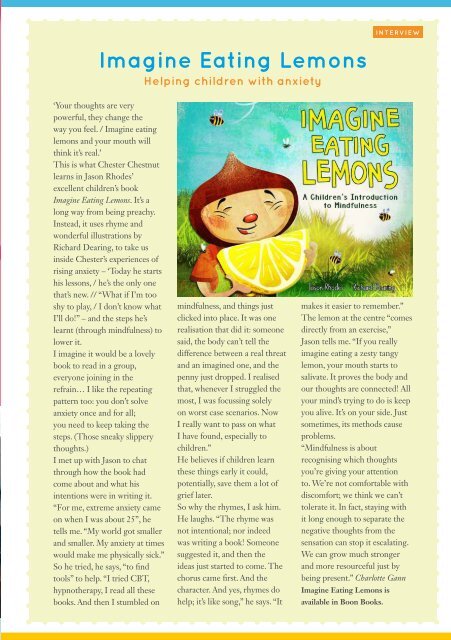Viva Lewes Issue #157 October 2019
You also want an ePaper? Increase the reach of your titles
YUMPU automatically turns print PDFs into web optimized ePapers that Google loves.
INTERVIEW<br />
Imagine Eating Lemons<br />
Helping children with anxiety<br />
‘Your thoughts are very<br />
powerful, they change the<br />
way you feel. / Imagine eating<br />
lemons and your mouth will<br />
think it’s real.’<br />
This is what Chester Chestnut<br />
learns in Jason Rhodes’<br />
excellent children’s book<br />
Imagine Eating Lemons. It’s a<br />
long way from being preachy.<br />
Instead, it uses rhyme and<br />
wonderful illustrations by<br />
Richard Dearing, to take us<br />
inside Chester’s experiences of<br />
rising anxiety – ‘Today he starts<br />
his lessons, / he’s the only one<br />
that’s new. // “What if I’m too<br />
shy to play, / I don’t know what<br />
I’ll do!” – and the steps he’s<br />
learnt (through mindfulness) to<br />
lower it.<br />
I imagine it would be a lovely<br />
book to read in a group,<br />
everyone joining in the<br />
refrain… I like the repeating<br />
pattern too: you don’t solve<br />
anxiety once and for all;<br />
you need to keep taking the<br />
steps. (Those sneaky slippery<br />
thoughts.)<br />
I met up with Jason to chat<br />
through how the book had<br />
come about and what his<br />
intentions were in writing it.<br />
“For me, extreme anxiety came<br />
on when I was about 25”, he<br />
tells me. “My world got smaller<br />
and smaller. My anxiety at times<br />
would make me physically sick.”<br />
So he tried, he says, “to find<br />
tools” to help. “I tried CBT,<br />
hypnotherapy, I read all these<br />
books. And then I stumbled on<br />
mindfulness, and things just<br />
clicked into place. It was one<br />
realisation that did it: someone<br />
said, the body can’t tell the<br />
difference between a real threat<br />
and an imagined one, and the<br />
penny just dropped. I realised<br />
that, whenever I struggled the<br />
most, I was focussing solely<br />
on worst case scenarios. Now<br />
I really want to pass on what<br />
I have found, especially to<br />
children.”<br />
He believes if children learn<br />
these things early it could,<br />
potentially, save them a lot of<br />
grief later.<br />
So why the rhymes, I ask him.<br />
He laughs. “The rhyme was<br />
not intentional; nor indeed<br />
was writing a book! Someone<br />
suggested it, and then the<br />
ideas just started to come. The<br />
chorus came first. And the<br />
character. And yes, rhymes do<br />
help; it’s like song,” he says. “It<br />
makes it easier to remember.”<br />
The lemon at the centre “comes<br />
directly from an exercise,”<br />
Jason tells me. “If you really<br />
imagine eating a zesty tangy<br />
lemon, your mouth starts to<br />
salivate. It proves the body and<br />
our thoughts are connected! All<br />
your mind’s trying to do is keep<br />
you alive. It’s on your side. Just<br />
sometimes, its methods cause<br />
problems.<br />
“Mindfulness is about<br />
recognising which thoughts<br />
you’re giving your attention<br />
to. We’re not comfortable with<br />
discomfort; we think we can’t<br />
tolerate it. In fact, staying with<br />
it long enough to separate the<br />
negative thoughts from the<br />
sensation can stop it escalating.<br />
We can grow much stronger<br />
and more resourceful just by<br />
being present.” Charlotte Gann<br />
Imagine Eating Lemons is<br />
available in Boon Books.

















